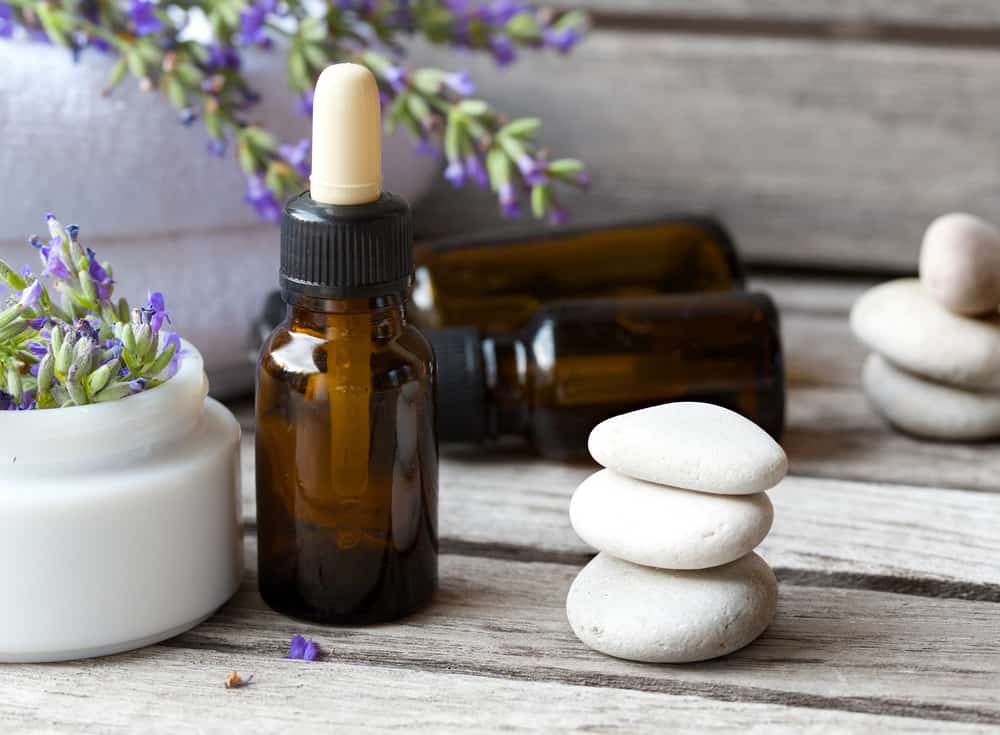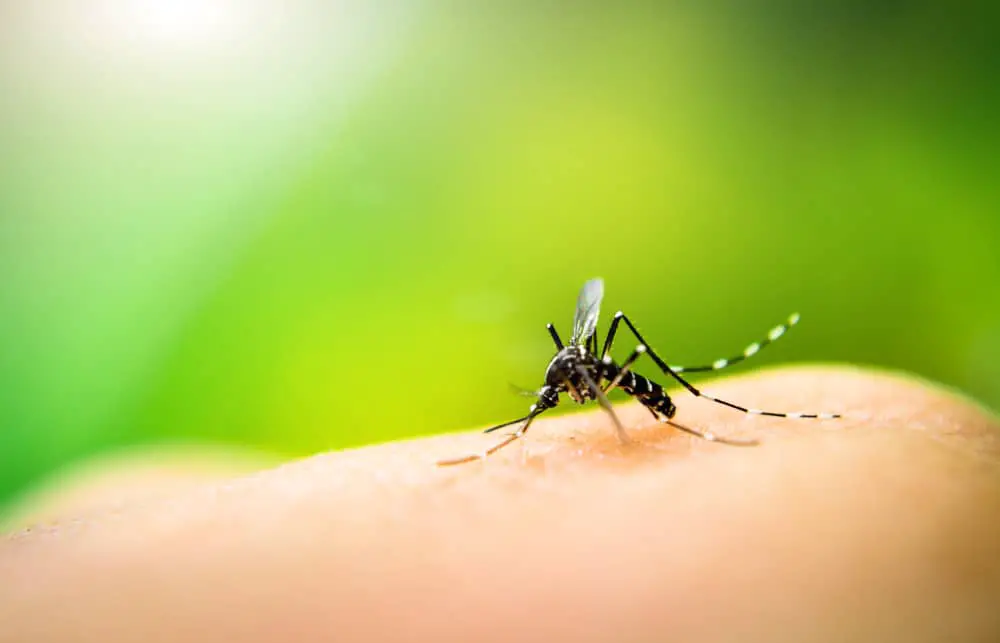For many years people had to make a choice between getting bitten by mosquitoes or spraying and lathering themselves with toxic DEET-based mosquito repellents. Mosquito bites itch and can even spread diseases like yellow fever and West Nile virus. The active ingredients in the chemicals that kept mosquitoes at bay in the past were neurotoxins which are linked to several late-life neurodegenerative diseases.
Nowadays, we have natural repellents for mosquitoes with natural ingredients. The main essential oils we hear about mess with a mosquito’s sense of smell and make it harder for them to find their prey, us. Citronella oil, lemon eucalyptus oil, and the smell of peppermint oil all have known pest-repellent properties and a pungent scent that stops annoying pests.
While citronella candles can stop Asian tiger mosquitoes from transmitting dengue fever, will lavender oil also prove to be a scent annoying mosquitoes hate? Let’s find out.
Will Lavender Repel Mosquitoes?
Yes, mosquitoes hate lavender and will avoid it if they can. The strong aroma of the essential oil can even surpass the oil of lemon eucalyptus in strong scents from natural plant oils. The lavender plant produces linalool, a natural compound that has a pungent aroma that acts as a natural insect repellent. Unfortunately, in order to kill mosquitoes naturally, you would need to mix lavender oil with witch hazel and spray it directly on the insects to kill them.
Along with being an effective repellent, it can also help your bug bites and soothe sensitive skin. Other compounds in lavender allow it to work as topical repellents that can keep mosquitoes away longer than oils diffused in the air. When mixed with sunflower oil or tea tree oil, you can provide intense skin relief while keeping blood-sucking mosquitoes away.
Is Lavander Plant or Oil Better to Stop Mosquitoes?

While it’s hard to know how to use natural plant ingredients to replace chemical mosquito repellents without some research, in most cases, a little bit of study goes a long way. The more concentrated the aroma of lavender, the stronger the repellent coverage for mosquitoes will be.
While it may seem obvious that the flowers will smell more richly, especially when fresh, the concentration of the oil can surpass that aroma when dispersed correctly. Below are some of the different effects of using lavender flowers and lavender oils to repel pests.
Flowers
If you have lavender flowers growing and blooming throughout your lawn, chances are you have plants that are actively keeping unwanted pests out of your yard. Plants like lemon balm and basil have smells that can deter a backyard of mosquitoes from hounding you and your guests. Fresh flowers can keep a small swarm of mosquitoes away indoors and out.
Lavender flowers can be dried out, but at this point, they will not work well to repel mosquitoes. There may still be an aroma making it suitable for potpourri but not a bug blocker. If you hang fresh flowers around your bed, you can deter mosquitoes until the flowers dry out. Once they are dry, you can soak them in essential oils to keep the aesthetics and increase the effectiveness of the lavender scent.
Oils
Using the essential oil of a plant is always going to be more effective since the oil is concentrated many times over. Just a few drops of essential oil, with the highest yields coming from the best pressing methods, can have the characteristics of many pounds of raw material. This makes it an excellent complement to commercial mosquito repellents. With oils, the main issue is how to disperse them so they will have the best impact against unwanted pests.
Diffusers are a way to get the aroma of oil into the air. Some use fire as a heat source others plug into the wall, and simple ones employ a basic wicking system to add fragrance to the air. Depending on the power of the diffuser and the oil density, you can get into the air; some diffusers provide large coverage from mosquitoes. Lavender oil released in a high-powered diffuser can make it impossible for female mosquitos to sense your carbon dioxide and locate your vulnerable blood.
Mixing essential oils with other oils, known as carrier oils, can create a lotion that is 100% natural and stops mosquitoes completely. Coconut oil, hemp oil, jojoba oil, and sunflower oil all have properties that make them good to apply to the skin. They don’t absorb right away and can offer lasting protection against sunburn and biting pests. Gone are the days of covering ourselves in industrial-grade chemicals to prevent a bug bite or two.
Sources of Lavender
Where you get your lavender from and the percentage of linalool available impact how effective lavender is at repelling mosquitoes. High-quality lavender oil will be far superior to shaved pieces of cheap lavender soap. However, the plants repelling features are so powerful that no matter what form or concentration the plant is in it will still stop some insects. Below are some common forms of lavender, how it is acquired, and how well it works as a pest repellent.
| Source | Process | Potency |
| Soap | Shave and place where bugs nest or dissolve in water and spray around rooms | Mild to moderate based on the concentration of soap to water and the method of application |
| Flower | Pick flowers and bunch them together | The more flowers gathered, the stronger the effect, moderate to highly effective |
| Essential Oil | Distillation and pressing can produce oils from plant materials that concentrate the aromas and taste | Extremely effective and with the right concentration and diffuse can prevent bites indoors and greatly reduce them outdoors. |
Soap
Soap shavings from bars of soap make good pest deterrents in areas that don’t get cleaned a lot, like storage and sheds. Dry soap shavings are not effective against mosquitoes and need to be dissolved in water to have any impact on them. Spraying dissolved lavender soap on mosquitoes can disorient and stun them. It can be effective to treat surfaces that mosquitoes are likely to land on.
The lavender soap will not have much of a repellent effect in the air as the solution is heavy and falls to the ground, where it is unlikely to scare off any mosquitoes. It is slightly more effective indoors but still isn’t the best way to utilize lavender to stop mosquitoes.
Flower
Fresh lavender flowers are much more potent than soap shavings and can repel mosquitoes and other pests either while alive on the plant or after being cut. The oils on the flowers produce an aroma that can keep pests at bay but may dry out where wind and environmental conditions are arid. As the flowers dry, they will have little to no effect on mosquitoes but may still leave a scent that can freshen a room.
Lavender flowers on living plants can be used to frame BBQ areas and other places mosquitoes frequent and try to make the need for lotions and candles less urgent. As you repel the mosquitoes with the fresh flowers growing on the plant, you can also begin harvesting some blooms to strategically place indoors and outdoors where pests are prominent.
Essential Oil
As an essential oil, lavender has the greatest impact as a pest repellent. The oils can be dispersed into the air in a fine mist that hangs suspended for several hours and can keep mosquitoes away for at least as long. This aerosol solution is 90% effective indoors and only 50% outdoors. However, when combined with other methods can help keep mosquitoes away.
Oils can also be applied as a skin cover to keep bugs from landing and biting. This topical approach can be used as a standalone technique or combined with candles and sprays to keep all manner of bugs away. Not only does lavender oil repel mosquitoes, it also soothes bites and relaxes your body. If mosquitoes are making it hard to sleep, lavender oil can also help with that.

